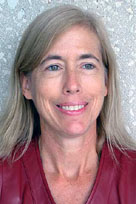For scholarship and inspired teaching in the area of architectural programming, Mardelle McCuskey Shepley, associate dean of student services at the Texas A&M College of Architecture, was recently named the William M. Peña Endowed Professor for Information Management.
“As a professor of architecture, Dr. Shepley has earned a reputation for integrating research in the classroom and stimulating the discovery process by engaging her students in meaningful projects,” said J. Thomas Regan, dean of the College of Architecture. “She is also an award-winning scholar who has contributed significantly to her field, and a humanitarian whose compassion is reflected in her works as well as those of her students.”
A member of the Texas A&M faculty since 1993, Shepley specializes in architectural design, social architecture, health care facility design, applied research and environmental psychology. In addition to her administrative duties as associate dean of student services, she serves as assistant director of the Center for Health Systems and Design at the College of Architecture. In 2001, Shepley received a Texas A&M University Faculty Fellowship, an honor awarded for demonstrated excellence in research, scholarship and leadership.
The Peña Professorship was created in 1990 by the CRS Center for Leadership and Management in the Design and Construction Industry. The endowment honors Willie Peña, a founding partner of the architectural firm Caudill Rowlett and Scott. Peña is credited with the development of the innovative architectural programming process called “Problem Seeking,” which is also the name of the widely used textbook Peña co-authored with John Focke and William Caudill. The professorship is awarded to an individual who has demonstrated a capacity to teach and conduct scholarly research in the area of information management.
“I am very honored to serve as Peña Professor for the College of Architecture,” Shepley said. “Mr. Peña, through his professional practice and the development of ‘Problem Seeking,’ made a huge contribution to architecture and is widely considered the father of architectural programming. He has been a wonderful mentor and leader.”
Shepley teaches a graduate course in architectural programming each spring and directs a graduate architecture-for-health design studio, “Healing Environments,” in the fall.
“I strive to instill in my students an increased awareness of their social responsibility to clients,” Shepley said. “This responsibility is the core of architectural programming.”
Shepley holds both a doctorate in architecture and a master of arts degree in psychology from the University of Michigan. She also earned a master of architecture and bachelor of arts from Columbia University.
Since joining the College of Architecture faculty, Shepley has served on 133 doctoral and master’s committees. She has also directed numerous student service projects in the Bryan-College Station area and throughout the state and nation.
Two projects recently tackled by Shepley’s Healing Environments studio were supported by a 2003 Social Justice Award from Adaptive Environments, a Boston-based international nonprofit organization dedicated to enhancing the experiences of people of all ages and abilities through excellence in design.
In one project for the residents of Sabine County, Texas, Shepley’s students designed a memorial honoring the fallen astronauts of the Space Shuttle Columbia. The East Texas community, which was deeply affected by the shuttle disaster, is raising funds for the memorial to be constructed near the site were the shuttle’s nose cone was recovered.
The other award-winning project was a rehabilitation center in Kemp, Texas for the Lewis and Clark Foundation, a non-profit organization dedicated to providing quality care alternatives to traditional nursing homes. The students designed a multi-facility campus that would eventually include a 24-bed assisted living center, a multi-family complex, a rehabilitation center, and a hospital and research facility.
| |
 Mardelle McCuskey Shepley
Mardelle McCuskey Shepley
 William M. Peña
William M. Peña
|